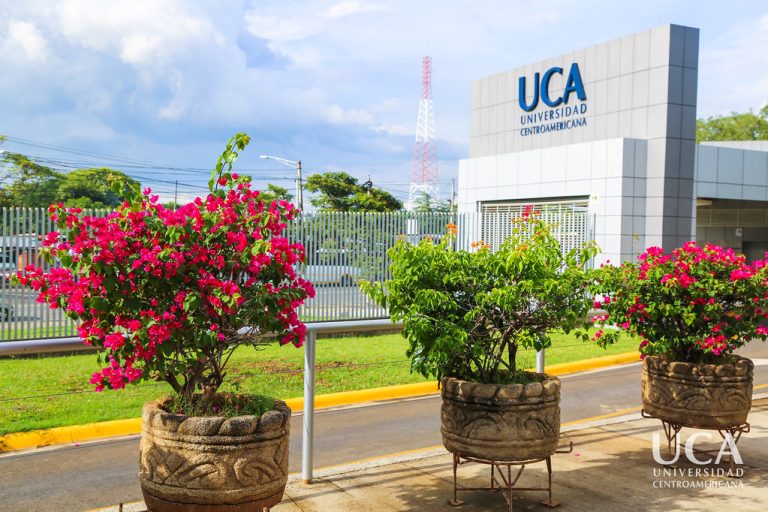17 de agosto 2023

Martinelli’s Stand-In Jose Mulino Wins Panama Presidency

PUBLICIDAD 1M
PUBLICIDAD 4D
PUBLICIDAD 5D
The Ortega regime's attack on UCA is a violation of academic freedom. The Jesuit institution has been labeled "terrorist"

Image of the facade of the Universidad Centroamericana (UCA) as seen from inside the campus. Photo: Taken from the UCA
A robust and autonomous educational system is essential for a thriving and enlightened society that empowers individuals to question the status quo. Private institutions have historically been a threat to tyrannical regimes, which is precisely why the Ortega-Murillo dictatorship has launched an assault on the Central American University (UCA), the country's primary private university established in 1960 by the Society of Jesus.
The Ortega regime's attack on UCA is a violation of academic freedom. The Jesuit institution has been labeled "terrorist", leading to asset seizures, closure, immobilization of properties, frozen bank accounts, and revocation of its accreditation. The dictatorship has also accused UCA of violating the constitutional order. These accusations are not new, as other organizations were also falsely accused and closed in 2018. The Central American Province of the Society of Jesus has issued a resolute statement rejecting the allegations and denouncing them as "false and baseless."
According to the Central American Province of the Society of Jesus, the regime has been relentlessly targeting educational and civic institutions in the country since 2018. The first attack occurred in June 2018, when the "Institute of Strategic and Public Policy Studies" (IEEPP) was targeted. Subsequently, in December 2018, the legal status of nine human rights organizations was revoked, and over 3,500 non-profit organizations have been either closed or declared illegal to date.
The confiscation of UCA is one of the most appalling abuses against independent educational organizations in Nicaragua. Under the Ortega-Murillo dictatorship, civic spaces have been closed, non-profit organizations including the Red Cross have been shut down, and 26 private universities have been closed. Additionally, over 10% of the Nicaraguan population has been forced into exile since 2018, and more than 70 people are arbitrarily detained. The main opposition leaders have been expelled from the country and stripped of their Nicaraguan nationality.
Amid repression, UCA stood for lucidity and non-violence. It was confiscated in retaliation for its role in the 2018 social protests, during which it provided refuge to demonstrators and criticized human rights abuses. The regime also expelled religious orders and severed relations with the Vatican.
The closure of universities is a reckless and harmful decision that is putting education and the country's progress at risk. It's clear that this move is part of the dictatorship's agenda to impose a political system similar to that of North Korea or the Taliban. This blatant attempt to control and manipulate the education system must be stopped for the good of the nation's future.
The confiscation of UCA, which has thousands of students and hundreds of professors, has significant implications for education in Nicaragua. With private universities becoming targets for the regime, there is a genuine concern about the erosion of independent thinking and the future of academic institutions in the country. It is widely recognized that the dictatorship completely controls the public education system, using it as a means of indoctrination.
It is crucial to remember that the closure and confiscation of UCA is not only a revenge for their courageous stand against the dictatorship's crimes against humanity, but also an act of repression against the Nicaraguan Catholic Church. Many civil organizations associated with the Church have been closed or expelled from the country. UCA's confiscation violates international treaties on religious freedom and must be addressed by the appropriate international bodies. Furthermore, over 80 religious figures have been expelled from the country, more than a dozen Catholic religious orders forced to withdraw from Nicaragua, and four priests, including Monsignor Rolando Alvarez, the bishop of the diocese of Matagalpa, have been arbitrarily arrested and imprisoned, with Alvarez sentenced to 26 years in prison.
The global community must stand as one with UCA, championing academic freedom and human rights in Nicaragua. The profound repercussions on UCA necessitate immediate action, harnessing every available resource. Numerous individuals and entities have already beseeched global citizens, governments, human rights advocates, and all dedicated to education and freedom across the hemisphere to echo our plea for unity and support. It's imperative that the world speaks out in defense of this treasured institution and denounces the unwarranted assaults by the Ortega-Murillo regime.
PUBLICIDAD 3M
Politólogo, académico y activista político nicaragüense. Fue secretario general del Ministerio de Defensa y director de Protección Civil durante la Presidencia de Enrique Bolaños. Es codirector fundador del Instituto de Liderazgo de la Sociedad Civil. Miembro de la opositora Unidad Nacional Azul y Blanco, exprecandidato presidencial, excarcelado político y desterrado por la dictadura orteguista.
PUBLICIDAD 3D